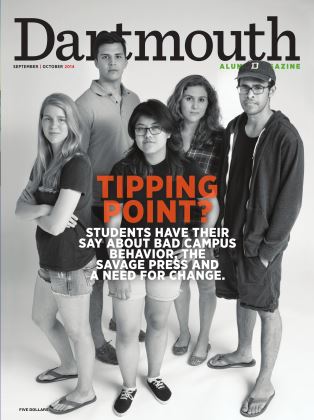WHAT DOES FRACKING HAVE TO DO WITH FRODO, or Middle-earth with mountaintop removal? Everything, says Dickerson, who has spent the last three decades dedicating himself to the study of J.R.R. Tolkien and how the British author's seminal works—The Lord of the Rings,The Hobbit—from the mid-20th century resonate today. "It's never didactic," says Dickerson, who was turned on to Tolkien by English professor Marion Singleton as a Dartmouth student. "It's got a moral lesson, a philosophical lesson, but it's in the midst of a good story that deals with the most important aspects of human experience."
Dickerson earned his Ph.D. in computer science at Cornell and now teaches at Middlebury College, where he is also the director of the New England Young Writers Conference. He is a prolific author and has published several books on Tolkien and medieval fantasy. Tolkien, he says, wrestled with many of the issues that we now face, from environmental concerns and healthy agrarianism to war and torture. Dickerson's recent analysis of Tolkien, Ents, Elves, andEriador: The Environmental Vision ofJ.R.R. Tolkien, earned him rave reviews from naturalists and scholars alike. Although Peter Jackson's enormously popular films (his third movie in The Hobbit trilogy is due in theaters in December) have exposed new generations to Tolkien's characters, imaginary world and environmental vision, says Dickerson, they glorify battles in a way the author never did.
"His writing is a bottomless well," says Dickerson. "You can continue to return to it and find that you may have taken gallons and gallons and gallons out, and you go back an hour later and the spring is filled in again. Every time I read or reread Tolkien, I learn something new."
The Tolkien king is working on his own three- volume medieval fantasy novel.
 View Full Issue
View Full Issue
More From This Issue
-
 FEATURE
FEATUREThe Rookie
September | October 2014 By Matthew Mosk ’92 -
 COVER STORY
COVER STORYWhat’s Going On Here?
September | October 2014 By Jennifer Wulff ’96 -
 Feature
FeatureCan Students Police Themselves?
September | October 2014 By EVA XIAO ’14 -
 Feature
FeatureOff the Beaten Path
September | October 2014 By RIANNA P. STARHEIM ’14 -
 Feature
FeatureNotebook
September | October 2014 By JOHN SHERMAN -
 Feature
FeatureClass Notes
September | October 2014 By DARTMOUTH COLLEGE LIBRARY







